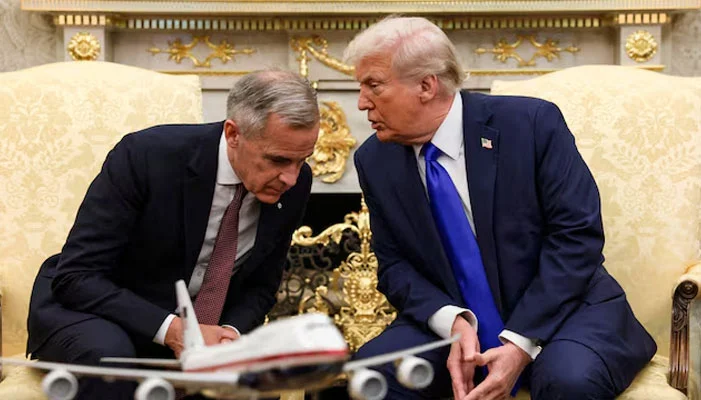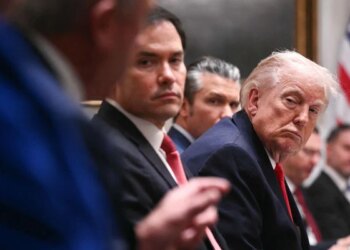Select Language:
A photo shows US President Donald Trump (on the right) in a meeting with Canada’s Prime Minister Mark Carney inside the Oval Office at the White House in Washington, DC, on October 7, 2025. — Reuters
– Ontario ran an anti-tariff advertisement featuring Ronald Reagan.
– Trump responded by announcing an increase in tariffs.
– Carney states he did not want the ad to be broadcast.
Canadian Prime Minister Mark Carney apologized to President Trump on Saturday for an anti-tariff political ad and advised Ontario Premier Doug Ford not to run it. After attending an Asia-Pacific summit in South Korea, Carney told reporters that he privately apologized to Trump during a dinner hosted by South Korea’s president on Wednesday.
“I did apologize to the president,” Carney confirmed, echoing Trump’s comments from Friday. He also said he reviewed the ad with Ford beforehand but opposed its release.
“I told Ford I didn’t want to move forward with the ad,” Carney added. The commercial, funded by outspoken Tory politician Ford—who is sometimes compared to Trump—features a clip of Ronald Reagan warning that tariffs lead to trade wars and economic ruin.
In retaliation, Trump announced plans to increase tariffs on Canadian imports and halted trade negotiations with Canada. Earlier this week, Trump described a pleasant encounter with Carney at the same dinner but did not provide details. On Friday, Trump reiterated that negotiations with Canada remain stalled, while Carney issued an apology for the ad quoting Reagan.
“I like him a lot, but what they did was wrong,” Trump said. “He apologized because it was a false advertisement.”
Meanwhile, Carney described his discussion with Chinese President Xi Jinping on Friday as a significant shift after years of strained relations. The last formal meeting between Canadian and Chinese leaders happened in 2017 when then-Prime Minister Justin Trudeau briefly spoke with Xi in San Francisco.
Carney explained that his trip to Asia aimed to diversify Canada’s economic ties away from heavy reliance on the U.S.







